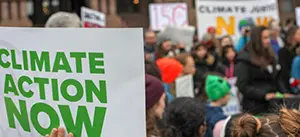 There are many ways that people can take action to reduce climate change, from personal behaviors like eating a more plant-rich diet to collective behaviors like political activism. Political activism (such as contacting government officials to express support for pro-climate policies) is one of the most significant ways to influence government policy-making.
There are many ways that people can take action to reduce climate change, from personal behaviors like eating a more plant-rich diet to collective behaviors like political activism. Political activism (such as contacting government officials to express support for pro-climate policies) is one of the most significant ways to influence government policy-making.
However, relatively few Americans engage in political actions to limit global warming, such as signing petitions, volunteering, or contacting government officials. While majorities think that global warming should be a high government priority and support various climate policies, there is a discrepancy between the public’s attitudes about climate action and their behaviors or actions that support it. Research that offers insights into this “attitude-behavior gap” can identify opportunities to reduce the gap and thereby strengthen both public and political will.
This analysis investigates the attitude-behavior gap on political climate action using the six most recent waves of the Climate Change in the American Mind surveys spanning 2021–2023 (n = 6,190 U.S. adults). The analysis focuses on four political actions: (1) signing a petition about global warming, either online or in person; (2) donating money to an organization working on global warming; (3) volunteering time to an organization working on global warming; and (4) writing letters, emailing, or phoning government officials about global warming. Respondents were asked about their willingness to engage in each of the behaviors and, separately, how many times they had done them over the prior 12 months. Comparisons are made gap between willingness to engage versus self-reported behavior across all four actions, and differences explored between Americans who are willing and active and those who are willing but inactive.
Click here to view the report.
Climate Change in the American Mind is conducted jointly by the Yale Program on Climate Change Communication and the George Mason University Center for Climate Change Communication.




